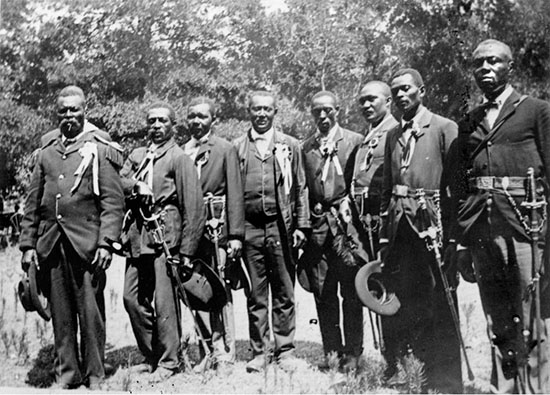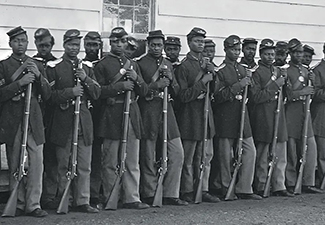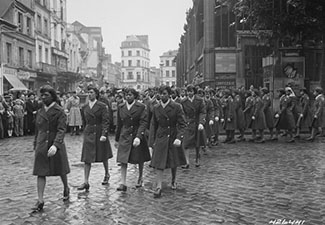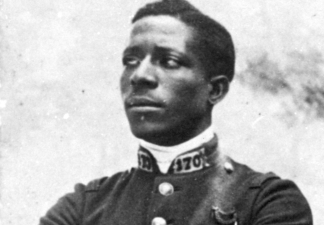Juneteenth Plays a Significant Part in the Nation’s Past … and Future

| Table of Contents | |
| A Brief History | |
| The Role of the U.S. Colored Troops | |
| Why This Day is Celebrated | |
| Juneteenth FAQs | |
| Suggested Reading List | |
As most people know, the Emancipation Proclamation, issued on Jan. 1, 1863, by President Abraham Lincoln, granted freedom to enslaved people in the Confederate states. However, the Emancipation Proclamation didn’t immediately end slavery, including in Southern border states that weren’t fighting against the Union, or Confederate states, like Texas, where word of the Emancipation Proclamation had yet to be delivered by Union troops.
On June 19, 1865, federal troops went into Texas to effectively end slavery in the U.S. and create a day of celebration and independence for African Americans across the country.
This was the birth of Juneteenth, commemorating an important event in our nation’s history and honoring those who fought to make it happen, including the U.S. Colored Troops, whose role in ending slavery and whose sacrifices for the country are often overlooked.
In 2021, Juneteenth became a federal holiday, recognizing the significance of this day in American history on a national level.
A Brief History
While news travels with the click of a button today, things were much different in the mid-1800s. The Emancipation Proclamation went into effect on the first day of 1863, declaring enslaved people in the states fighting against the Union “shall be then, thenceforward, and forever free.” But that did not guarantee freedom for all slaves, including those in places like Texas, which was primarily removed from most of the fighting because of its remote location.
Although the Civil War was still raging at the time, word was being spread to enslaved people across the South that the Emancipation Proclamation granted their freedom, and many went on to join the Union troops in the war. In April of 1865, Gen. Robert E. Lee surrendered on behalf of the Confederacy, but slavery was nearly unaffected at the time in Texas, which had little presence of Union troops.
On June 19, 1865, federal troops, led by Gen. Gordon Granger, arrived in Galveston, Texas, to announce the end of slavery and the freedom of the more than 250,000 enslaved people in the state.
Slavery was officially abolished throughout the United States with the passage of the 13th Amendment in December of 1865.
The Role of the U.S. Colored Troops
Most people know the Civil War as a battle between the Union and Confederacy, or the North vs. South, but what’s often left out is the role Black soldiers and the U.S. Colored Troops played in ending slavery and spreading the word of the Emancipation Proclamation.
While not officially allowed to serve in the military at the start of the war, many African Americans volunteered to fight for the Union. After much debate, Lincoln officially allowed Black men to join combat roles in Union military forces in 1863 with the signing of the Emancipation Proclamation, although many had already been fighting for Union forces throughout the South after the passage of the 2nd Confiscation Act and Militia Act in 1862. Despite lower wages, poorer living conditions, less access to weapons, and much greater risks if captured by Confederate troops, Black soldiers played an essential role in the Union winning the Civil War.
Lincoln acknowledged this invaluable service and sacrifice, saying, “Without the military help of the black freedmen, the war against the south could not have been won.”
The U.S. Colored Troops (USCT) also played a role in ending slavery in Texas, helping spread the word that slavery had been abolished.
“The USCT were a big part of bringing the message into Galveston,” said Sam Collins, Texas historian and co-chair of the Juneteenth Legacy Project.
Collins also detailed the often-unrecognized contribution that could only have been made by Black service members and volunteers during the Civil War.
“The North could not have won if not for the Black troops, the United States Colored Troops, because in addition to additional manpower, many of them were former slaves who had important intel,” Collins said. “What is often forgotten is that those runaway slaves knew the Southern territory and landscape. So not only did they take their physical bodies when they ran away, hurting the labor force of the Southern plantations, they also took intel with them. They knew where the creeks were; they knew where you could cross; they knew where [the Confederacy] was storing guns and supplies. So, they would have been able to share that information with Union officers.”
From 1861 to the end of the Civil War in 1865, approximately 186,000 Black soldiers served in the Union Army and 38,000 were killed in action.
Read about the Role of Black Troops in the War of 1812
Why This Day is Celebrated
While Juneteenth is seeing more recognition, it has been widely celebrated by African American communities since its beginning, with the first official celebration on June 19, 1866, in Texas. Since then, the day has grown to be celebrated across the country as Juneteenth Independence Day or Emancipation Day.
Everybody who values freedom and liberty should celebrate Juneteenth because it celebrates the evolution of our country to a more perfect union.
Juneteenth became an official state holiday in Texas in 1980 and became a nationally recognized federal holiday in 2021.
While the day officially recognizes the end of slavery in Texas, it’s also a day everyone can learn from.
“Everybody who values freedom and liberty should celebrate Juneteenth because it celebrates the evolution of our country to a more perfect union,” Collins said. “We were not perfect in 1528 when the first non-native enslaved person arrived in Galveston. We were not perfect and 1619, 1776, 1865, or even today, but hopefully we continue to work and move into a more perfect union."
Juneteenth is often celebrated similarly as July 4, with picnics, family gatherings, fun, and fireworks, because it is also a day of Independence.
“The Fourth of July was a freedom birthday for the country,” Collins said. “So just like a family, we're family members who have different birthdays. We celebrate on both days, because not everybody was free on July 4, and Juneteenth represents that expansion of freedom to others.”
Juneteenth FAQs
Why is it called Juneteenth?
The name is a combination of the words “June” and “19th”, signifying the day – June 19, 1865 – federal troops entered Galveston, Texas, to declare the end of slavery and the signing of the Emancipation Proclamation.
Why is Juneteenth important?
Much like July 4, Juneteenth is a celebration of African American freedom and independence in the United States, as well as a celebration of Black history and culture. It also serves as a reminder of the past and the hopes for the future of the nation.
Is Juneteenth a national holiday?
President Joe Biden signed the Juneteenth National Independence Day Act on June 17, 2021, making Juneteenth a federal holiday. Juneteenth became a state holiday in Texas on Jan. 1, 1980.
How do you celebrate Juneteenth?
Juneteenth serves as Independence Day for many people across the country and is often celebrated similarly. There are festivals, parades, cookouts, family and community get-togethers, and fireworks. Celebrations also include church and prayer ceremonies, historical re-enactments, and concerts. However you decide to celebrate, Juneteenth is a great time to learn about this significant date in our nation’s past, the sacrifice of Black service members in our nation’s history, and what this day represents.
Suggested Reading List
For more on the history of Juneteenth and the U.S. Colored Troops, Collins suggests the following books:
- Juneteenth 101 by D.J. Norman-Cox
- Juneteenth: The Story Behind the Celebration by Edward T. Cotham Jr.
- Like Men of War: Black Troops in the Civil War 1862-1865 by Noah Andre Trudeau
- I Freed Myself: African American Self-Emancipation in the Civil War Era by David Williams
Contact: — Paris Moulden, Public Relations, pmoulden@woundedwarriorproject.org, 904.570.7910
About Wounded Warrior Project
Since 2003, Wounded Warrior Project® (WWP) has been meeting the growing needs of warriors, their families, and caregivers — helping them achieve their highest ambition. Learn more.


